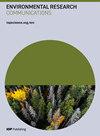Optimisation of decision-making on risk management strategy for the hydromelioration systems in biosphere reserves
IF 2.9
4区 环境科学与生态学
Q3 ENVIRONMENTAL SCIENCES
引用次数: 0
Abstract
The field of nature conservation in Ukraine is currently experiencing a profound crisis. In light of the mounting risks to Ukraine’s ecosystems, it is of paramount importance that conservation planning incorporates risk management strategies. In the aftermath of the Chernobyl disaster, the management of water bodies in the Exclusion Zone assumed paramount importance, given that the rivers had become the primary conduit for the transportation of radioactive substances. It is therefore imperative to evaluate the risks and vulnerabilities of climate change on Ukraine’s most developed economic sectors, population, and natural ecosystems. This will facilitate comprehension of the prospective consequences of climate change, ascertain the extent of potential losses, and inform decision-making aimed at reducing or preventing such losses in a timely manner. One of the primary challenges facing specialists at the Chornobyl Radiation and Ecological Biosphere Reserve, in addition to other organisations and enterprises of the State Agency of Ukraine on Exclusion Zone Management and scientific institutions, is the assessment of the feasibility of hydromelioration systems. It is of the utmost importance that a scientifically sound methodological approach be employed in order to ensure the reliability and validity of the results obtained through the assessment of risks and vulnerabilities to climate change. In this context, the utilisation of adaptive methodologies is of paramount importance for the development of risk management strategies. One such methodology is the Methodology for Risk Analysis and Information Management for Strategic Ecosystems (MARISCO). This article considers the potential deployment of the MARISCO adaptive method as a universal methodology for the analysis of environmental issues, with a view to informing decision-making on risk management strategies in the Chornobyl Radiation and Ecological Biosphere Reserve.优化生物圈保护区水质净化系统风险管理战略决策
乌克兰的自然保护领域目前正在经历一场深刻的危机。鉴于乌克兰生态系统面临的风险越来越大,将风险管理战略纳入保护规划至关重要。切尔诺贝利灾难发生后,由于河流已成为放射性物质运输的主要通道,禁区内的水体管理变得至关重要。因此,必须评估气候变化对乌克兰最发达的经济部门、人口和自然生态系统造成的风险和脆弱性。这将有助于理解气候变化的预期后果,确定潜在损失的程度,并为旨在及时减少或预防此类损失的决策提供信息。切尔诺贝利辐射与生态生物圈保护区的专家以及乌克兰国家禁区管理署的其他组织和企业以及科研机构面临的主要挑战之一是评估水质改良系统的可行性。最重要的是采用科学合理的方法,以确保通过评估气候变化的风险和脆弱性而获得的结果的可靠性和有效性。在这种情况下,采用适应性方法对制定风险管理战略至关重要。战略生态系统风险分析和信息管理方法(MARISCO)就是这样一种方法。本文探讨了将 MARISCO 适应性方法作为分析环境问题的通用方法的可能性,以期为切尔诺贝利辐射与生态生物圈保护区的风险管理战略决策提供信息。
本文章由计算机程序翻译,如有差异,请以英文原文为准。
求助全文
约1分钟内获得全文
求助全文

 求助内容:
求助内容: 应助结果提醒方式:
应助结果提醒方式:


